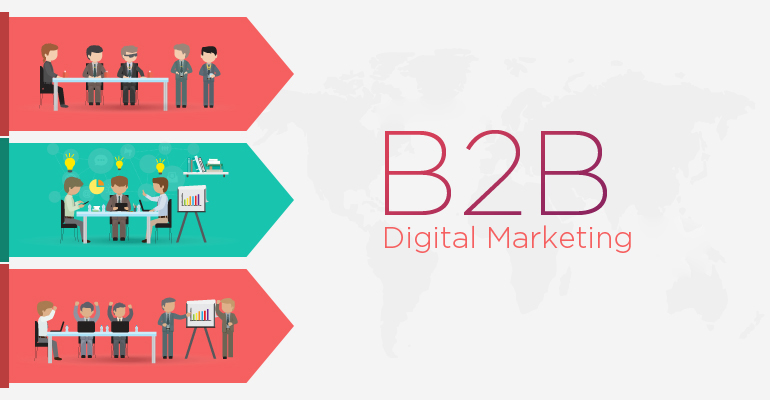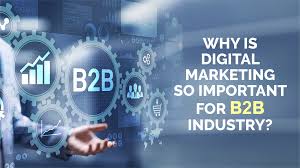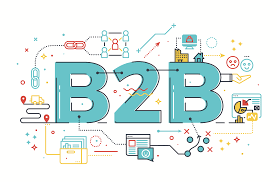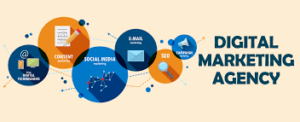How B2B Digital Marketing Strategies Can Skyrocket Your Business Success!

Digital marketing for B2B Businesses, especially during a recession, as it fuels and sustains the sales cycle. However, some businesses tend to make the mistake of reducing their spending instead of doubling down on digital marketing to maintain healthy profit margins and ensure continued success.
It is essential to continuously track, test, modify, and redefine your strategic plan to keep up with the rapid pace of technology and millennial preferences. Failure to do so may result in your B2B company being overshadowed by emerging marketing trends.
What is B2B digital marketing?
B2B digital marketing refers to any online marketing strategy or tactic intended to promote your business to another organization. If you’re promoting products or services to other businesses (instead of an individual consumer) online, you’re most likely employing B2B digital marketing. In today’s complex and competitive marketplace, B2B marketing strategies often target multiple personas within an industry. Unlike B2C marketing, which concentrates on individual consumers, B2B marketing hones in on the specific needs and interests of other businesses. It’s about making other businesses familiar with your brand, demonstrating the value of your product or service, and ultimately converting them into customers. If you’re a new marketer in the B2B space, don’t worry—it’s not so different from typical consumer marketing, and we’ll go over everything you need to know to create an effective B2B marketing strategy. 🚀

- Unlike business-to-consumer (B2C) marketing, which targets individual consumers, B2B marketing strategies focus on reaching decision-makers within businesses.
- B2B marketers create content for various business buyers, ranging from sole proprietors to executives at large corporations. Their goal is to provide factual information that demonstrates how products and services can impact the target company’s revenue.
- Trust and thought leadership are crucial in B2B marketing efforts.
What are B2B digital marketing strategies?
Developing effective B2B digital marketing strategies enables businesses to effectively engage their target audience in a competitive online environment. These strategies enhance visibility, attract high-quality leads, foster relationships, and drive conversions. By executing a well-crafted B2B digital marketing strategy, businesses can enhance brand credibility, strengthen customer relationships, and achieve a higher return on investment (ROI).
Let’s delve into some effective B2B digital marketing strategies that can help businesses connect with their target audience and drive growth:
- Define Your Target Audience: Start by understanding your ideal customer. Create detailed buyer personas that encompass demographic and psychographic information. Knowing your audience informs every other marketing decision.
- User-Friendly B2B Website: Ensure your website is intuitive, responsive, and provides a seamless experience for visitors. Clear navigation, relevant content, and easy-to-find information are crucial.
- Search Engine Optimization (SEO): Optimize your website and content for search engines. Use relevant keywords, create high-quality content, and focus on both on-page and off-page SEO techniques.
- Content Marketing: Share valuable insights and information through content. This includes blog posts, whitepapers, case studies, and industry reports. Position your brand as an authority in your niche.
- Email Marketing: Nurture leads and strengthen customer relationships through targeted email campaigns. Personalize your messages and provide relevant content to engage your audience.
- Hyper-Personalization: Tailor your communication to individual prospects. Use data to create personalized experiences, such as customized emails or product recommendations.
- Blend Emotions With Actions: Appeal to both logic and emotions. Showcase how your product or service solves real-world problems while also evoking positive feelings.
- Establish Credibility: Share knowledge and value. Create thought leadership content, participate in industry events, and collaborate with influencers to build trust.
- Interactive Elements: Incorporate videos, images, quizzes, and infographics. Engage your audience with interactive content that educates and entertains.
- Branded Keywords: Target high-intent customers by using branded keywords. When potential clients search for your brand, ensure they find relevant and compelling content.
Remember, B2B marketing is about building relationships, demonstrating value, and converting businesses into loyal customers. Stay informed about trends and adapt your strategies accordingly to thrive in the dynamic B2B landscape. 🌟
B2B Digital Marketing Strategies to Boost Sales and Revenue
A well-rounded B2B marketing strategy combines these tactics, adapts to industry trends, and consistently delivers value to your target audience. 🚀!
Here are some effective B2B digital marketing strategies that can help boost sales and revenue growth:
- Create a Channel Partner Marketing Program: Collaborate with channel partners (distributors, resellers, etc.) to expand your reach. Joint marketing efforts can lead to increased visibility and sales.
- Invest in a Long-Term Content-Based SEO Strategy: Optimize your website and content for search engines. High-quality, relevant content attracts organic traffic and improves your search rankings.
- Use Account-Based Marketing (ABM): Target high-value customers by tailoring your marketing efforts to specific accounts. ABM focuses on personalized outreach and relationship-building.
- Build a Community in Your Industry: Engage with industry peers, clients, and prospects through online forums, webinars, and events. A strong community fosters trust and can lead to referrals and partnerships.
- Use Interactive Content to Drive Engagement: Create quizzes, polls, calculators, and other interactive content. Engaging experiences encourage prospects to spend more time with your brand.
10 Digital Marketing Strategies for B2B Companies

1. Define your target audience:
Positioning is the process of establishing a distinct and memorable identity for your B2B brand in the minds of customers. By differentiating yourself from competitors, you enhance your image and foster customer loyalty. Effective positioning ensures that your business stands out and remains memorable in the eyes of your target audience.
2. Create valuable content:
Content marketing is a valuable complement to SEO efforts. By creating relevant and informative content that aligns with the needs and interests of your buyer personas, you can attract them to your website. By catering to each stage of the customer journey, from research to purchase readiness, you increase the chances of converting them into loyal customers through effective content engagement and nurturing. Use blogs, whitepapers, case studies, and videos to showcase your expertise and build credibility.
3. Optimize for search engines:
Content marketing should not be treated as a peripheral activity but rather as a central component of your overall marketing strategy. In the B2B space, SEO should prioritize delivering value rather than mere visibility. Quality content that aligns with the specific needs and search queries of your target businesses is crucial for a successful and targeted marketing approach.
Make sure your website is SEO-friendly by including the following:
- Essential keywords and meta descriptions
- Optimizing photos
- The site mobile-friendly
4. Use paid advertising:
Investing in PPC ads enables B2B companies to effectively promote their content and brand to their target audience across search engines, social media platforms, and other advertising channels. PPC campaigns also provide an opportunity to collect valuable first-party data through lead-generation initiatives. It is crucial to ensure that relevant ads are shown to the appropriate persona segments for maximum impact platforms like Google Ads and social media channels to target specific keywords, demographics, and industries.
5. Leverage social media:
Maintaining active profiles on key social media platforms is essential for B2B digital marketing. LinkedIn, Twitter, and Instagram have emerged as effective channels for engaging with customers and sharing regular content. Social media pages can be utilized to promote websites, repurpose content into short videos or shareable infographics, and leverage paid ads to reach a targeted B2B audience. Leveraging social media effectively enhances brand visibility, engagement, and lead generation.
6. Email marketing campaigns:
This low-cost approach allows B2B enterprises to stay in touch with prospects, nurture leads, and promote their products/services. Nurture leads and maintain customer relationships through targeted email marketing campaigns. Personalize messages, provide valuable insights and offer exclusive promotions to drive engagement and conversions.
7. Use marketing automation:
Marketing automation software offers cost-effective solutions to enhance the efficiency of marketing campaigns. By automating lead nurturing, email marketing, and social media posting, businesses can save time and resources. Using a CRM system allows for streamlined marketing processes by automatically integrating customer data, sending targeted email campaigns, and facilitating other marketing activities.
8. Have a user-friendly B2B website
To build trust with prospects, ensure your B2B website is user-friendly, responsive, and mobile-friendly. Simplify navigation and enable seamless actions such as downloading case studies, subscribing to newsletters, and completing forms. A smooth and intuitive website experience enhances engagement and encourages conversions.
Collaborate on joint marketing initiatives, co-create content, and share resources to mutually benefit. Participate in industry conferences, trade shows, and webinars to network, showcase your expertise, and generate leads. Continuously track and analyze key metrics to measure the effectiveness of your digital marketing efforts. Use data insights to refine your strategies, optimize campaigns, and improve overall performance.
3 Key Benefits of Digital Marketing for B2Bs
Embracing digital marketing as an integral part of your overall strategy can unlock sustainable growth and help you stay competitive in the ever-evolving B2B landscape. Let’s explore the key benefits of B2B digital marketing that can significantly impact your business:
- Measurability: Unlike traditional marketing strategies, B2B digital marketing is highly measurable. You can easily track the success of your campaigns and strategies. Metrics such as website traffic, conversion rates, and engagement levels provide valuable insights.
- Improved Search Ranking: Effective digital marketing efforts can boost your search engine rankings. By optimizing your content and website, you increase visibility and attract more potential clients. Appearing higher in search results enhances your brand’s credibility.
- High Return on Investment (ROI): B2B digital marketing offers a compelling ROI. When executed strategically, it generates leads, nurtures relationships, and drives sales. The cost-effectiveness of digital channels makes it an attractive investment for businesses. 🌟
How does B2B digital marketing differ from B2C marketing?
B2B marketing targets businesses as customers, while B2C marketing targets individual consumers. While both B2B and B2C marketing may utilize similar channels, there are crucial distinctions that demand different approaches for each. Understanding the unique characteristics of the target audience is essential in developing effective strategies and messaging for B2B and B2C marketing initiatives.
- Customer relationships: B2B marketing focuses on building personal relationships, while B2C marketing tends to have a more transactional approach.
- Branding: B2B marketing emphasizes positioning, while B2C marketing focuses on messaging.
- Decision-making: B2B marketing prioritizes open communication in the decision-making process, while B2C marketing aims for quick and easy decision-making.
- Audience targeting: B2B marketing involves niche audience targeting, whereas B2C marketing follows a broader funnel-focused approach.
- Ad copy: B2B marketing employs terms familiar to clients, while B2C marketing can be more playful and emotionally driven in its ad copy.
What are the Benefits of B2B digital marketing?
B2B digital marketing empowers you to enhance brand awareness, effectively communicate the value proposition of your product or service, and drive higher conversion rates among your target audience.
- Precise targeting: B2B marketing allows for precise targeting of specific stakeholders within organizations.
- Buyer journey outreach: B2B marketing efforts can engage stakeholders at different stages of the buyer journey.
- Measurable results: B2B marketing enables measurement of results and the flexibility to make adjustments based on data.
- Increased visibility: B2B digital marketing helps companies reach a larger online audience, making it easier to acquire new customers.
- Cost-effectiveness: B2B digital marketing can be cheaper and reach a broader audience compared to traditional marketing methods.
- Adaptability to customer preferences: B2B digital marketing allows organizations to cater to the changing demands and preferences of customers who rely on digital channels for research and purchasing decisions.
- Brand enhancement and thought leadership: B2B digital marketing enables organizations to differentiate themselves in a competitive market by strengthening their brand and establishing thought leadership in their industry.
- Expanded reach: B2B digital marketing leverages internet channels such as social media, email, and search engines to connect with a wider audience.
- Engaging informed customers: B2B digital marketing facilitates connections with well-informed and empowered customers who have access to vast amounts of online information.
- Higher ROI: B2B digital marketing can deliver a higher return on investment by allowing organizations to focus their marketing efforts precisely and accurately measure their results.
B2B Digital Marketing Agency and Its Important

In summary, B2B digital marketing agencies play a crucial role in helping businesses build brand awareness, generate quality leads, and drive growth in the competitive digital landscape. Let’s delve into the world of B2B digital marketing agencies and explore their significance and role:
- What are B2B Digital Marketing Agencies?
- B2B digital marketing agencies specialize in providing marketing services to businesses that sell products or services to other businesses (as opposed to individual consumers).
- These agencies focus on creating effective digital strategies to reach and engage business audiences.
- Their services encompass various aspects of digital marketing, including SEO, content creation, social media management, paid advertising, and more.
- Why Are They Important?
- Expertise: B2B digital marketing agencies have specialized knowledge and experience in targeting business audiences. They understand the unique challenges and dynamics of B2B marketing.
- Efficiency: Outsourcing marketing tasks to agencies allows businesses to focus on their core competencies while professionals handle marketing efforts.
- Scalability: Agencies can adapt to changing business needs, whether it’s scaling up during growth or adjusting strategies based on market shifts.
- Cost-Effectiveness: Hiring an agency can be more cost-effective than maintaining an in-house marketing team.
- Access to Tools and Technology: Agencies have access to advanced tools, analytics, and platforms that enhance marketing effectiveness.
- How Do B2B Digital Marketing Agencies Operate?
- Strategy Development: Agencies work closely with clients to understand their goals, target audience, and competitive landscape. They create customized digital marketing strategies.
- Execution: Agencies implement the strategies across various channels, such as social media, email, content marketing, and paid advertising.
- Measurement and Optimization: They track performance metrics, analyze data, and optimize campaigns for better results.
- Collaboration: Effective communication between the agency and the client ensures alignment and successful execution. 🚀👩💻
How does Digital Marketing work for a B2B Company
In B2B digital marketing, a company utilizes various online channels and strategies to target and engage other businesses. This includes tactics such as content marketing, SEO, social media marketing, email marketing, and paid advertising to generate leads, build relationships, and drive conversions in the B2B space.
In simple terms, B2B digital marketing encompasses any online marketing strategies or tactics aimed at promoting a company to other organizations. When you advertise products or services online specifically to businesses rather than individual consumers, you are effectively engaging in B2B digital marketing.
Is There Any B2B Digital Marketing Certification
To effectively capture and involve a B2B audience, it is essential to comprehend the utilization of highly efficient digital marketing channels and tactics. The Professional Diploma in Digital Marketing, accredited by DMI (Digital Marketing Institute), provides comprehensive training in fundamental aspects of digital marketing like strategy formulation, analytics, and content marketing. Additionally, it offers specialized knowledge in areas such as SEO, PPC, display advertising, and video advertising. Enrolling in this program will enable you to develop a lead-driven strategy and enhance revenue generation. Take the first step today!
How B2B Digital Marketing Strategies Can Skyrocket Your Business Success.
In the realm of B2B expansion, revenue growth, and customer acquisition, digital marketing has become an indispensable tool. Through the implementation of effective strategies and tactics, B2B enterprises can establish a robust online presence, connect with their desired audience, and stand out from competitors.
To optimize their return on investment (ROI) and achieve desired outcomes, businesses must track crucial metrics and make data-driven adjustments. A crucial initial step in any prosperous marketing campaign is gaining a profound understanding of the target audience. Moreover, content marketing and social media advertising plays a pivotal role in the success of a B2B company’s digital marketing strategy. These components are particularly advantageous in capturing the attention of the intended audience.
Why Ignoring B2B Digital Marketing in 2024 Is a Mistake
Disregarding B2B digital marketing in 2024 is comparable to neglecting your daily coffee ritual — it will result in falling behind and losing touch with the market.
Now, let’s examine the reasons why neglecting this crucial strategy can be a costly error:
- Strong Digital Presence: In today’s business landscape, leaders are actively engaged online. Without a robust digital presence, you’re losing out on important first impressions and valuable connections.
- Real-Time Relevance: In the fast-paced digital era, staying digitally active is crucial to keeping up with news and trends. Being inactive means you’re consistently late to the party and trailing behind your competitors.
- Cost-Effective Targeting: Digital marketing allows for precise targeting, ensuring you reach your desired audience without wasting resources. It’s a smart and cost-efficient approach, unlike the ineffective “throw spaghetti at the wall and see what sticks” method.
Developing an Effective B2B Marketing Framework
Developing an effective B2B marketing framework requires a systematic approach that aligns marketing efforts with business objectives to drive lead generation, customer acquisition, and revenue growth.
Before developing the strategies, have a look at the framework:
- Brand awareness: Generate visibility and recognition for the brand.
- Multi-participant approach: Engage with various stakeholders involved in the B2B buying process.
- Continuous improvements: Adapt strategies based on research and insights throughout the buyer journey.
- Purchase process: Simplify and facilitate the purchase of goods and services.
- Post-purchase experience: Ensure a smooth and satisfying experience after the purchase.
- Customer loyalty: Foster ongoing loyalty and retention through effective engagement strategies.
As a B2B marketer, it’s important to recognize that new B2B buyers exhibit similar expectations as B2C clients. They anticipate personalized attention, a smooth purchasing process, and exceptional service. To cultivate long-term customer relationships and optimize ROI, the digital marketing strategy should effectively guide the B2B audience throughout their buyer journey.
Digital Marketing for B2B Businesses
B2B digital marketing is a dynamic field that caters to businesses selling products and services to other companies. Let’s explore the essentials of B2B digital marketing and some effective strategies:
- What Is B2B Marketing?
- B2B (business-to-business) marketing targets organizations rather than individual consumers.
- Its purpose is to make businesses familiar with your brand, demonstrate the value of your offerings, and ultimately convert them into customers.
- B2B marketing involves reaching decision-makers within other companies.
- Key Differences Between B2B and B2C Marketing:
- B2B: Focuses on businesses, longer sales cycles, and precise targeting of decision-makers.
- B2C: Targets individual consumers, shorter buyer journeys, and broader audience reach.
- Effective B2B Marketing Strategies:
- Positioning: Clearly define your business’s unique value proposition.
- Audience Understanding: Know your target audience’s pain points, challenges, and needs.
- User-Friendly Website: Ensure your B2B website is informative, easy to navigate, and optimized for search engines (SEO).
- Content Marketing: Provide valuable insights through blog posts, whitepapers, and case studies.
- Email Marketing: Nurture leads and strengthen customer relationships through personalized email campaigns.
- B2B Marketing Trends to Watch in 2023:
- Stay updated with new research and expert insights.
- Adapt to emerging technologies and changing buyer behaviors.
Remember, successful B2B marketing hinges on understanding your audience, delivering value, and building trust. 🚀🔗
See More:
- How to Buy B2B email lists | 20 Best B2B Mailing Lists
- What are SaaS Companies with b2b SaaS Examples | Best Types
- B2C vs D2C Marketing: Which One Right for You: Best Examples
- B2B SaaS Sales Funnel Stages: Best Step-By-Step Guide
-
How B2B Digital Marketing Strategies Can Skyrocket Your Business Success!



